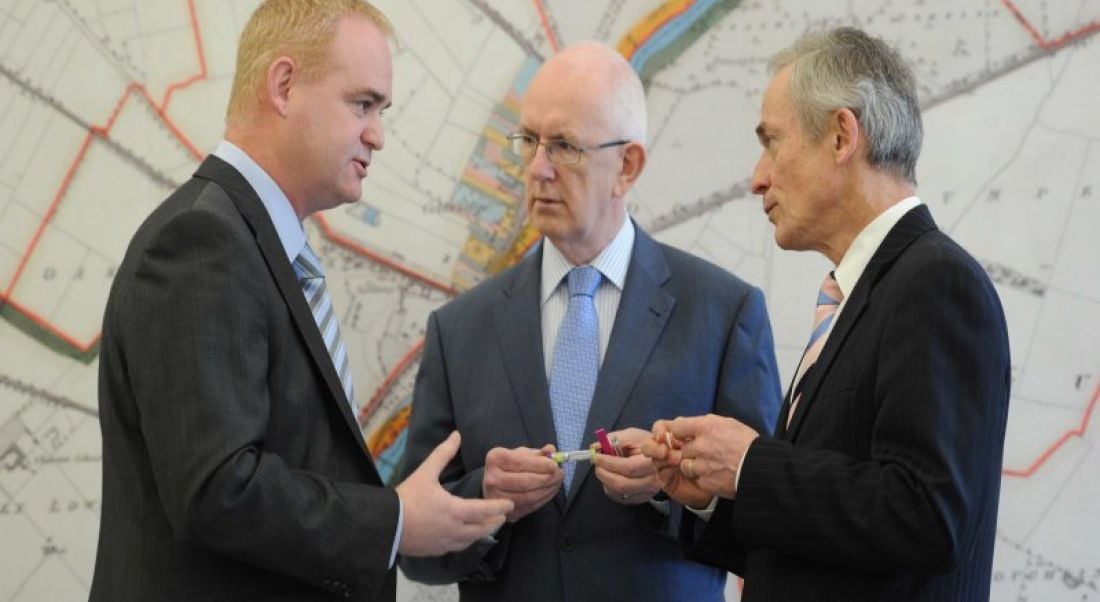There is an awakening of sorts happening in the economies most blighted by the banking collapse and resulting recession. Countries like the US are wondering why it allowed its manufacturing industries to disappear and now Apple is bringing assembly lines back to the good ole USA. It is shocking still how close Ireland came to letting it all slip away.
I’ve always said it: you can’t export a house. Yet the only way to describe Ireland’s descent into economic madness in the years leading up to the final day of reckoning when the nation’s banks collapsed in 2008 is this: it was State-sponsored. The misguided and naive political leadership of the day played an active role in allowing the nation’s focus to shift from productive, export industries in the areas of manufacturing of technology, pharmaceuticals and a range of other vibrant sectors to a property-fuelled binge that has wrought nothing but ghost estates, emigration and heartbreak.
Strangely, it is precisely those technology-based industries, including manufacturing, that we nearly allowed to slip away in a whirl of property page gluttony that are providing Ireland with the much-needed lifeline it needs to pull itself out of the abyss, to dust itself off and be respectable again. I call it a second chance. And we’d be fools not to see it.
I feel this keenly because for much of this I was there. I remember a time of crippling unemployment and then one summer in the early 1990s when people simply stopped leaving and friends found jobs. I remember the flow of manufacturing into Ireland in the early 1990s, the growth of the IT industry and other sectors to a point that the economic boom that began to be felt in the late 1990s felt right because it was based on productivity.
I also remember the dotcom collapse of 2000, Ireland being relatively unscathed and yet the country’s media’s overreaction to a point that several years’ supply of potential IT graduates who could fill current skills gaps were squandered on fields like property development and law because their parents got scared. Now the same families are likely to talk by Skype every weekend between Ireland and Australia.
At the height of the property bubble, I remember someone from a big five management consultancy telling me that manufacturing is dead.
A new beginning
Manufacturing is not dead and, if anything, it’s more vital to Ireland’s future. Even if it doesn’t often involve manufacturing physical goods, managing the supply chain from field to fork or R&D lab to shop counter is critical.
In 1989, Intel started operations in a car showroom in Dublin – within five years Ireland was supplying 50pc of the world’s supply of Pentium processors as the PC revolution raged. Today, it employs close to 5,000 people and is building the assembly lines for future generations of microprocessors.
I sat in a press conference at the Conrad Hotel in Dublin in 1994 as HP announced plans to begin manufacturing inkjet cartridges in Ireland. For the past four years HP – which employs 4,000 people in Leixlip, Co Kildare – has successively launched jobs projects in new areas like cloud computing.
Apple has been in Cork since 1981, currently employs 2,800 people in the city and is about to add another 500 new jobs as part of a major expansion.
At the Dublin Web Summit I spoke to Liam Casey of Cork-headquartered PCH International, a man who has become something of a kingmaker for Silicon Valley companies through his ability to orchestrate a global manufacturing and design supply chain and is growing employment worldwide to 3,000 people. Casey will calmly and coolly tell you how he can deliver a robot or a next-generation smartphone from the designer’s desk to the shopping basket in a few well-organised and thrifty steps.
What I’m trying to tell you is this: we Irish are good at this stuff. We understand hard work, we come up with left-field, often creative, solutions to problems and we have proven this time and time again for companies like Apple, Dell, Microsoft, Google, Facebook, IBM, SmithKline, Pfizer, Intel, HP and many others for decades now.
We adapt to industry shifts and technology changes, we roll our sleeves up and we just get on with it. We are also tenacious.
Last week, Apple CEO Tim Cook revealed the company is bringing assembly lines back to the US. The only thing, he said, that’s holding him and other industry giants from bringing more back is the quality of education required to people the lines.
This is where Ireland has the advantage – it has the managers with the experience and the young people with the skills to keep manufacturing and R&D close to one another. That is imperative.
These thoughts rushed through my head this morning to the point that I barely took in the salubrious surrounds of Castletown House in Celbridge, Co Kildare, where MSG.Mfg Group Inc revealed it is creating 150 new jobs as part of a US$12m three-year investment at a new manufacturing facility on the HP campus in Leixlip.
Enterprise Minister Richard Bruton, TD, who has revealed plans that will see 20,000 manufacturing jobs emerge in Ireland by 2016, summed up rather well. “Part of what we are trying to do is transition the Irish economy from a model based on property to one where its true future lies. We have the capacity to build quality innovation and services export markets.”
He paid tribute to the farsightedness of the general manager of MGS.Mfg Michael Cummins, who spearheaded the project with the help of HP.
“It’s a tribute to the quality of the workforce and the ability to get a quality workforce to feed into the supply chain of one of the most iconic companies in the world.”
The road back
Despite the economic woes Ireland has been enduring because of the property collapse, Bruton said the past two years were, in fact, two of the most successful in the history of IDA Ireland. Some 12,000 private-sector jobs were created.
IDA Ireland CEO Barry O’Leary said that for every one job created in an FDI company a further seven could be generated in the local economy. Think about that for a second. Each new job means more money spent in the local shop, restaurant, dry cleaners. The term ‘a rising tide lifts all boats’ comes to mind.
Ireland’s economic travails will take years to reach any kind of conclusion, before ordinary people can once again feel good about their country.
But let’s take heart, we didn’t lose our manufacturing industries in the madness that was the property bubble, and now there’s a road back.
Bruton summed it up quite well: “Our focus on exporting was lost, we became uncompetitive and there was pressure on sectors like manufacturing. We weren’t as attractive as we are now. IDA Ireland is doing a superb job marketing Ireland, they are looking at emerging companies and industries, as well as established names. We are seeing a resurgence of Ireland as a place to do business.”
Something to consider
As jobs in areas like analytics, e-commerce, social media, and pharmaceuticals flow in, it is hard not to feel concern for people from a myriad of traditional sectors laid low by the recession who are wondering how these jobs apply to them. Unemployment stands at more than 13pc in Ireland.
There was something in MGS.Mfg’s jobs announcement that triggered possibilities. While many of the jobs are available for graduates with mechanical and polymer engineering degrees, it was refreshing to hear that most of all what Cummins is searching for is people with aptitude.
On one hand it signalled that as manufacturing returns to Ireland, jobs will open up or many people from different walks of life who don’t necessarily have PhDs or who can write software but are willing to work. That’s good news.
It also reminded me of an interesting development at Ericsson in Athlone, whereby 40 graduates who joined a conversion course got full-time jobs. One hundred more people are signed up to the IBEC and DIT programme.
The new door that is beginning to open for Ireland’s workforce of 2016 was aptly described by Cummins: “We are looking for people with an aptitude for engineering, people who left university early and we will support them through apprenticeships and part-time degree courses.
“It is important that we have multiple skills across the company. Everybody has a place.”
Exactly. Everybody has a place.




